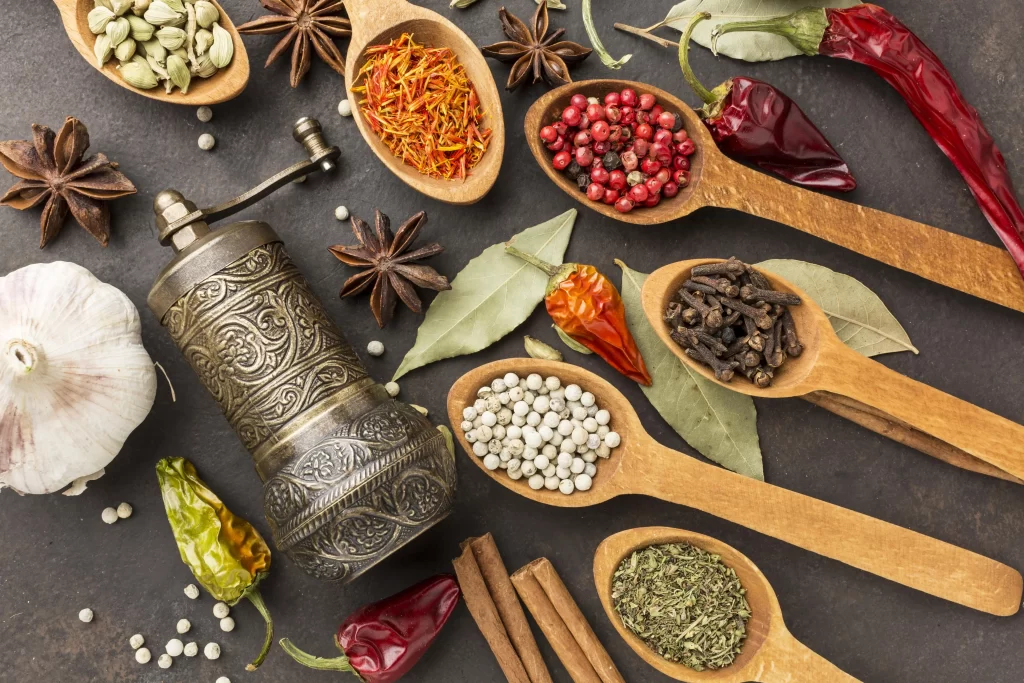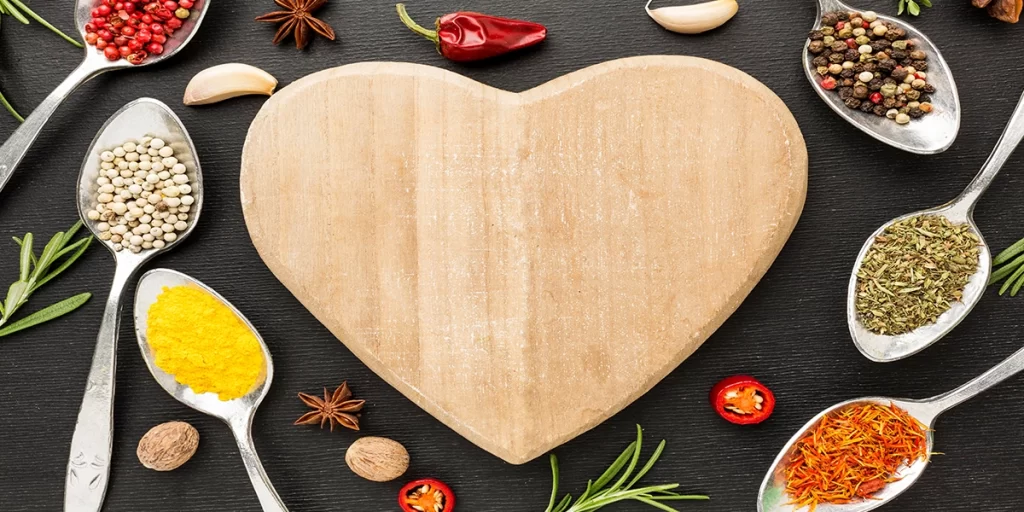Spices have been used for health purposes for thousands of years across various cultures and traditional medicine systems. Many spices contain bioactive compounds such as antioxidants, anti-inflammatory agents, and antimicrobial substances. These natural compounds are believed to contribute to various health benefits and can be used as alternative or complementary remedies to support overall well-being.
Spices are rich in antioxidants, which help neutralize harmful free radicals in the body. Free radicals can cause oxidative stress, leading to cellular damage and various health issues. Consuming antioxidant-rich spices can help combat oxidative stress and promote better health.
- Some spices contain anti-inflammatory compounds that can help reduce inflammation and its negative effects on the body.
- Some spices, like cayenne pepper, may help boost metabolism and aid in weight management efforts.
- Several spices have demonstrated potential benefits for heart health, including improving cholesterol levels, supporting healthy blood pressure, and reducing the risk of cardiovascular diseases.
- Spices like saffron have been traditionally used to improve mood and alleviate symptoms of depression and anxiety.
Various spices have been used for centuries not only to add flavor to food but also for their potential health benefits.
Here are some spices that are believed to have health-promoting properties:
- Turmeric: Curcumin, the active compound in turmeric, is a powerful anti-inflammatory and antioxidant agent. It has been associated with potential benefits for reducing inflammation, improving heart health, and supporting brain function.
- Cinnamon: Cinnamon is known for its ability to help regulate blood sugar levels and improve insulin sensitivity. It may also have antioxidant and anti-inflammatory properties.
- Ginger: Ginger contains bioactive compounds that have been shown to help with digestion, reduce nausea, and alleviate inflammation.
- Garlic: Garlic is rich in allicin, a compound with potent antimicrobial properties. It may also have heart-protective effects by improving cholesterol levels and blood pressure.
- Black Pepper: Black pepper contains piperine, a compound that enhances the bioavailability of certain nutrients and has antioxidant properties.
- Cumin: Cumin is a good source of antioxidants and has been associated with potential anti-diabetic effects and improved digestion.
- Cloves: Cloves contain eugenol, a compound with antimicrobial properties. They are also rich in antioxidants and may have anti-inflammatory effects.
- Cardamom: Cardamom has been linked to improved digestive health and may also help with bad breath and oral health.
- Cayenne Pepper: Capsaicin, the active component in cayenne pepper, has been shown to have pain-relieving properties and can boost metabolism.
- Saffron: Saffron is rich in antioxidants and may have mood-enhancing properties. It has been used traditionally to improve mood and reduce symptoms of depression.
It’s essential to note that while spices can offer potential health benefits, they are not a substitute for a balanced diet and a healthy lifestyle. Always consult with a healthcare professional before using spices or any supplements for medicinal purposes, especially if you have existing health conditions or are taking medications. Additionally, some people may be sensitive or allergic to certain spices, so it’s essential to use them in moderation and pay attention to any adverse reactions.
Health Benefits of Culinary Herbs and Spice
Culinary herbs and spices not only enhance the flavors of our dishes but also offer a range of potential health benefits.
Here are some common culinary herbs and spices and the health benefits associated with them:
- Basil: Basil contains essential oils with antimicrobial properties and is a good source of vitamins A and K, as well as antioxidants.
- Oregano: Oregano is rich in antioxidants and has antimicrobial properties. It may help support the immune system and fight against harmful microorganisms.
- Rosemary: Rosemary is a good source of antioxidants and anti-inflammatory compounds. It may also improve digestion and memory.
- Thyme: Thyme contains thymol, a natural antiseptic compound. It has been used traditionally for respiratory health and as a digestive aid.
- Parsley: Parsley is rich in vitamin C, vitamin K, and antioxidants. It may help support bone health and provide immune system benefits.
- Mint: Mint has been used for its digestive properties, as it may help alleviate indigestion and bloating.
- Sage: Sage contains compounds with antioxidant and anti-inflammatory properties. It may also support brain health and improve memory.
- Coriander (Cilantro): Coriander is a good source of vitamins A, C, and K, as well as antioxidants. It may help promote digestion and support heart health.
- Bay leaves: Bay leaves contain unique plant compounds with potential anti-inflammatory and antioxidant effects.
- Dill: Dill is a good source of calcium and may help support bone health. It also contains antimicrobial compounds.
- Marjoram: Marjoram has antioxidant properties and may help with digestive issues.
- Allspice: Allspice contains eugenol, a compound with potential anti-inflammatory and analgesic effects.
- Nutmeg: Nutmeg has been used in traditional medicine for its potential pain-relieving properties and digestive benefits.
- Paprika: Paprika contains capsaicin, which is known for its potential metabolism-boosting and pain-relieving effects.
- Saffron: Saffron is rich in antioxidants and may have mood-enhancing properties.
It’s important to note that the health benefits of culinary herbs and spices are generally associated with their consumption as part of a balanced diet. While these herbs and spices can complement a healthy lifestyle, they are not a replacement for medical treatments or professional healthcare advice. Always consult with a healthcare professional if you have specific health concerns or conditions. Additionally, individual responses to herbs and spices may vary, and some people may be sensitive or allergic to certain varieties, so use them in moderation and observe any adverse reactions.
Spice for Controlling Blood Sugar
Cinnamon is one of the most well-known spices that may help in controlling blood sugar levels. Several studies have shown that cinnamon can improve insulin sensitivity and enhance the way the body uses glucose, leading to better blood sugar regulation. The active compounds in cinnamon, particularly cinnamaldehyde and procyanidins, are believed to be responsible for its potential benefits.
Research suggests that consuming about 1 to 6 grams of cinnamon per day (approximately 0.5 to 2 teaspoons) may help improve blood sugar levels in people with type 2 diabetes or insulin resistance. However, it’s important to note that while cinnamon can be beneficial, it should not be considered a substitute for prescribed diabetes medications or a proper diabetes management plan.
It’s always best to consult with a healthcare professional before using cinnamon or any other supplement as a blood sugar control measure, especially if you have diabetes or are taking other medications. Individual responses to spices may vary, and using them in combination with a balanced diet and regular exercise is the most effective approach for managing blood sugar levels.

Herbs & Spices to Reduce Inflammation
Several herbs and spices have anti-inflammatory properties that can help reduce inflammation in the body. Chronic inflammation is linked to various health conditions, so incorporating these herbs and spices into your diet may have potential health benefits.
Here are some of them:
- Turmeric: Curcumin, the active compound in turmeric, is a potent anti-inflammatory agent. It inhibits various inflammatory molecules in the body, which can help reduce inflammation and its associated health risks.
- Ginger: Ginger contains bioactive compounds with anti-inflammatory effects. It has been used traditionally to alleviate inflammation and may help with conditions like osteoarthritis and muscle pain.
- Cinnamon: Cinnamon has anti-inflammatory properties and may help reduce inflammation-related symptoms and markers.
- Garlic: Garlic contains sulfur compounds with anti-inflammatory effects. It may help support the immune system and reduce inflammation in the body.
- Rosemary: Rosemary contains rosmarinic acid, a compound with anti-inflammatory properties. It may help protect against inflammation and oxidative stress.
- Basil: Basil contains essential oils with anti-inflammatory effects, which may help combat inflammation and associated health issues.
- Thyme: Thyme contains compounds like carvacrol and thymol, which have anti-inflammatory properties.
- Oregano: Oregano is rich in antioxidants and contains compounds that have been found to have anti-inflammatory effects.
- Cloves: Cloves contain eugenol, a compound with anti-inflammatory properties.
- Sage: Sage contains rosmarinic acid, which has anti-inflammatory and antioxidant properties.
- Green Tea: While not a spice or herb, green tea contains catechins with powerful anti-inflammatory and antioxidant effects.
- Black Pepper: Black pepper contains piperine, which has been found to have anti-inflammatory effects and enhance the bioavailability of other beneficial compounds.
When incorporating these herbs and spices into your diet, it’s essential to do so as part of a balanced and healthy eating plan. Remember that while these natural remedies can support overall health, they are not a substitute for medical treatment or advice. If you have specific health concerns or conditions, it’s best to consult with a healthcare professional for personalized recommendations.
Spice may improve skin quality ?
Yes, some spices have properties that may help improve skin quality when used topically or incorporated into your diet.
Here are a few spices known for their potential benefits for the skin:
- Turmeric: Curcumin, the active compound in turmeric, has anti-inflammatory and antioxidant properties. It may help soothe irritated skin, reduce redness, and promote a more even skin tone.
- Cinnamon: Cinnamon has antimicrobial properties that may help combat acne-causing bacteria. It can also improve blood circulation when applied topically, giving your skin a healthy glow.
- Ginger: Ginger contains antioxidants that can help protect the skin from free radical damage and premature aging.
- Cloves: Cloves have antiseptic and anti-inflammatory properties, which can be beneficial for acne-prone skin.
- Fenugreek: Fenugreek seeds are often used topically to soothe inflamed skin and reduce redness and irritation.
- Cardamom: Cardamom has antioxidant properties that can help protect the skin from oxidative stress and damage.
- Coriander (Cilantro): Coriander has anti-inflammatory properties and may help calm irritated skin.
- Nutmeg: Nutmeg contains antibacterial compounds that can be useful for managing acne-prone skin.
- Saffron: Saffron has been used traditionally to brighten the skin and improve complexion.
When using spices on the skin, it’s essential to be mindful of potential allergic reactions or skin sensitivities. It’s a good idea to perform a patch test on a small area of your skin before applying the spice to a larger area. In addition to topical use, including these spices in your diet can also benefit your skin. Their antioxidant and anti-inflammatory properties can help protect your skin from the inside out and contribute to a healthy complexion.
Remember that while spices can support skin health, they are not a substitute for a comprehensive skincare routine and a healthy lifestyle. Proper cleansing, moisturizing, sun protection, and a balanced diet are essential for maintaining good skin quality. If you have specific skin concerns, consult with a dermatologist for personalized advice and treatment.
Spice may Improve your heart health ?
Yes, certain spices have properties that may contribute to heart health when used as part of a balanced diet and healthy lifestyle.

Here are some spices that have been associated with potential benefits for heart health:
- Garlic: Garlic is known for its heart-protective effects. It may help lower blood pressure, reduce cholesterol levels, and improve blood circulation, all of which can contribute to better heart health.
- Turmeric: Curcumin, the active compound in turmeric, has anti-inflammatory and antioxidant properties that may help protect the heart from damage caused by inflammation and oxidative stress.
- Cinnamon: Cinnamon has been linked to improved blood sugar control, which can be beneficial for individuals with diabetes or insulin resistance—a condition that affects heart health.
- Ginger: Ginger has anti-inflammatory properties that may help reduce inflammation and lower the risk of developing heart disease.
- Cayenne Pepper: Capsaicin, the active component in cayenne pepper, may help improve circulation, support blood vessel health, and reduce blood pressure.
- Cardamom: Cardamom has been associated with potential benefits for reducing blood pressure and improving heart health markers.
- Black Pepper: Black pepper contains piperine, a compound that may have cholesterol-lowering effects and support heart health.
- Saffron: Saffron has been studied for its potential to improve cholesterol levels and reduce the risk of heart disease.
- Rosemary: Rosemary contains compounds that may help protect the heart from oxidative stress and inflammation.
- Thyme: Thyme has been shown to have vasodilatory effects, meaning it may help relax blood vessels and improve blood flow.
It’s important to remember that while these spices can be beneficial for heart health, they are not a replacement for a heart-healthy diet and lifestyle. A well-balanced diet, regular physical activity, not smoking, managing stress, and maintaining a healthy weight are all essential factors in promoting heart health.
If you have existing heart conditions or concerns about your heart health, it’s crucial to consult with a healthcare professional for personalized advice and guidance. They can help you create a plan that suits your individual needs and supports your heart health goals.
If you don’t like this article/post please share your feedback.





